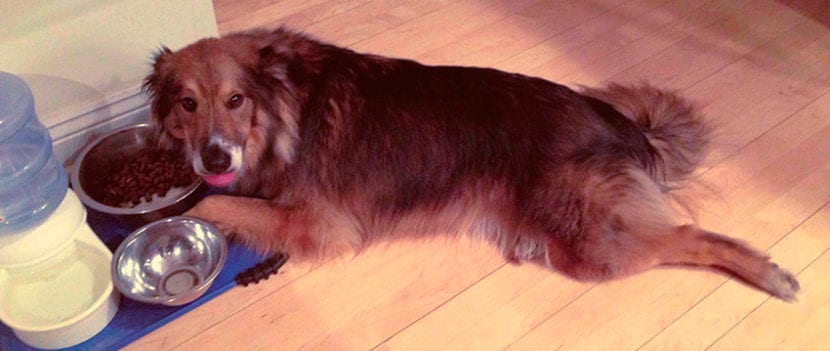
The industry that has been generated around the food from our dogs, It is something immense, being a sector that handles billions of euros a year (according to the economic press, the sector has increased its income by 42% since 2014, which was more than 15000 million euros) and that managed to create an image around the idea of canine feeding, which, supported by veterinary practice, has turned the idea that feeding our dogs with dog food in pellets is the best thing to do. And I check it daily.
One of my first questions at a professional level when I begin a teaching-learning process with clients is to what does the dog eat, and 95% of the time people give me the same answer, very sure of themselves… I think. Today in the entry What does my dog eat ?, I give you the answer that I give to my clients. Do not miss it.
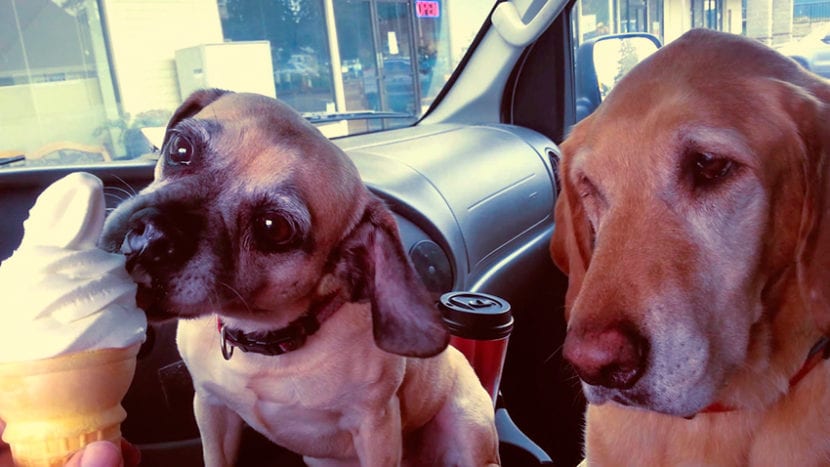
Let's put ourselves in context
It is very normal for people to think that I think is the best your dog can eat, since normally, the person in charge of your dog's health is your veterinarian. He is the one who recommends that you feed him I think, and even many times, he is in charge of selling it to you. And that's where I see the problem.
When a veterinarian leaves the career, he has invested a few years in learning Veterinary Medicine, however in those years of career, he has not had time to know EVERYTHING about all the species and races of living beings that are on Earth. They are not experts in everything, they have to continue preparing to specialize in something. In some cases this specialization will come to them through a master's degree at a University and others will come from a weekend seminar paid for by a canine feeding company. And this is how this works ...
The vet is invited by a commercial of a brand to attend a seminar on canine nutrition, which apart from being free and having a degree endorsed by the same company (it is said any of the companies that there are today of the great ones), comes an expert in dog nutrition of international fame. At the same congress, he is told about the benefits of pellet feeding for dogs and when it is over, the company offers him the possibility of selling his entire line of products… at his clinic or veterinary office. This for a veterinarian who has just finished his degree and does not have all the information on the subject that he should, becomes a business opportunity. I know very few veterinarians who do not sell feed. This fact is a gold mine for feed brands and one of the most effective ways to promote, create and consolidate a brand that have been seen, since with this system and marketing campaigns that are usually amassed based on hundreds of millions of euros per year, and that tend to have a quality beyond any doubt, have given us as a result that 96% of Dog owners believe that buying feed for their dog is the best option for their food.
And this ends up being a deadly mistake for the quality of life of our dog... and for your health ...
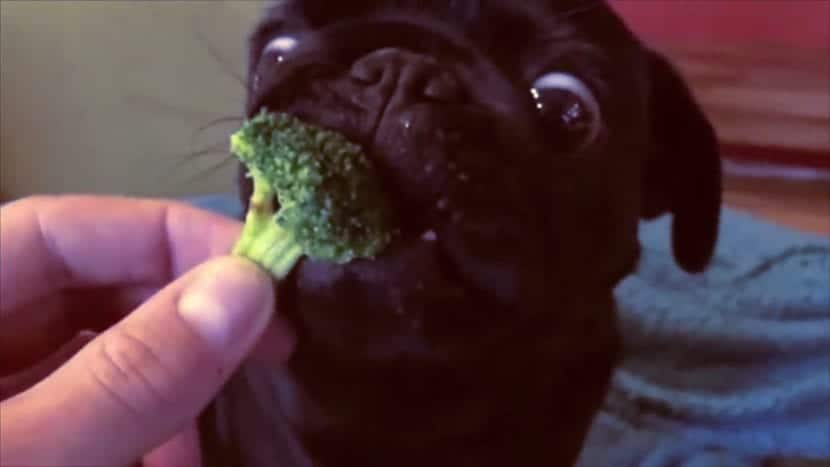
The actual situation
If what the canine food companies based on industrial feed say were true, and their products were the latest technology in dog food, being the recipes and formulas that are given nicknames as "Complete Food" (What the heck is supposed to be that?), the best nutritional option for our animals ... Why are clinics full of dogs with food allergy problems and food stress?
For me this is an absolute and incredible mystery ...
There is already a wide and proven connection between industrial dog food and various pathologies in dogs, and this is said by nutrition experts such as Carlos Alberto Gutiérrez, Donald Strombeck or Jonathan Self.
Mr. Self is a well-known British nutritionist and columnist, founder of the http://honeysrealdogfood.com/, where he advocates a improvement of the quality of life of our animals by improving their diet.
Recently, Mr Self said in a program dedicated exclusively to talking about the food industry and its irregularities on British television:
“The dog food industry has convinced us otherwise. I believe that nine out of 10 visits to the vet are due to a bad diet of the animals "
These statements of Self are not surprising, since how is it possible that there is so many food-related illnesses of our dogs if they are food of such quality?
The dog food of most of the well-known brands, including their anti-allergy products, are made with by-products of human industry. And not only in the food industry, but also in the fertilizer industry and the soap industry. These by-products fall within the food regulations applicable to the animal feed industry, however, despite being legal, they leave much to be desired when it comes to being nutritious. These by-products are mostly low-quality grains and leftovers such as beet pulp, animal blood, feathers, beaks, claws, hooves, ridges, and ultimately anything that we humans do not eat. This is what you feed your dog. Normal that he is desperate for the tasty food you eat, especially if you feed him I always think.
This type of recipe that dog food companies offer us, is created almost exclusively for them to earn as much money as possible, of a base product that they would otherwise have to throw away, and that by turning it into dog food, they turn it into real gold.

But what is this?
Most of these feed claim to be endorsed by scientific studies, which are installed under the precept that dogs have become omnivores by adapting to their new diet, which although it sounds very nice to say, has no scientific validity. It would take a dog about 100000 years to develop a digestive process that would make it an omnivore. Industrial feed is only about 140 years old. I see it very difficult.
Another determining factor when analyzing the situation is who are the ones that make the feed and what interests move them.
As I said before, feed brands earn a lot of money (and the more time passes, the more they earn), and as I have also said before, they spend a lot of money on advertising of the most effective that exist, and that has created an image regarding them of trust that does not concern the reality.
One wonders how these brands correspond to the trust that their consumers place in them, and the truth is that the answer is terrible. What they do is violate that trust to the maximum, which leads me to be able to assure that it is one of the greatest betrayals of a consumer's trust, no longer by a brand, but by an entire industry worldwide, formed this for several multinationals that control the entire market.
Who dominates this market?
These multinationals take advantage of any type of by-product (ultimately waste) that some human industries may generate, and magically turn it into a highly valuable asset for their profit accounts. And I explain it to you.
Imagine for a moment, a multinational food company, which has several brands that are dedicated to marketing different types of prepared chicken dishes in different countries ... How many tons of chicken beaks and feathers do they generate? How many million tons, it would be much more correct. Can you imagine how much it must cost them to manage all that waste? Of course, depending on the current legislation in that country, however, why spend money to eliminate this waste when we can turn it into a way to earn money? ... And that they have done ...
Imagine that they have managed to create a product, based on the remains of the chicken (for example), made with everything that we throw from the processing of it for our food industry (feathers, beak, claws and crest) and after processing it from new and give it a package, we sell it much more expensive a kilo of that product than what a kilo of chicken costs us in a normal and current market. Well it is a star business of huge profits.
And this leads us to the next question ... When have we seen a multinational do the best for the client? ... Please, leave me your answers in the comments of this post. I do not know of any case.

What are they made of?
Industrial dog food based on cereals, they do not cover in any way the needs of the dog to nourish itself, as much as those of the manufacturer of the feed to profit. And it is a disaster wherever you look at them ...
When they talk to you about a “complete food for your dog”, they are not deceiving you… at all.
Nutritionists who work for brands, they have to follow nutritional values that the same brand imposes on it, that are marked by the daily needs of dogs. Or at least some of them.
These brands create products that meet the nutritional needs of dogs chemically and artificially. This is already something for me very negative. Apart from the recipe for the normal feed that we buy in supermarkets and large stores, they have very low humidity levels (to prevent the feed from rotting easily) and very high levels of dry matter. To get an idea, the natural food that we eat is 80% water and 20% dry matter, while industrial feed is 90% dry matter and 10% water. This has various effects on the dog, such as a large amount of stools, and problems with tartar and dental plaque, apart from subjecting its digestive system to more effort than if it ate natural food, keeping the stomach macrobiota at minimum levels in the process , which will make you have diarrhea when you change food, which is another factor that helps brands maintain their theory.
Afterwards, the feed is a food subjected to all kinds of processes that include disinfected with chemical products, high temperatures, pressurized treatments, everything to achieve, more than a goal of feeding, a specific type of presentation that is what its consumers expect. And to be able to get rid of all the waste that your industry generates taking money out of you at the same time.
The point I want to get to is: How have they managed to convince us that an artificial and over-processed product, created from the worst of raw materials, is healthier and more nutritious than a good piece of chicken?
Well, very easy, spending billions of euros on advertising campaigns, in manipulating data and above all, and in market research to give people what people want, easy and affordable food for their animals, that they are assured that they are doing the best for their animals, and not complicate their lives. That is what they promise, although as we see in this entry and in others such as in the History of the Dog Feed Industry, the companies that manufacture industrial feed for dogs based on cereals, commit for me one of the biggest violations of a manufacturer to consumer, as they sell us a lie in a very nice package and yet, under the promise of healthy eating, they poison our best friends. This does not mean that there are no other options at BARF that allow you to reconcile having a pet with your work and family life. Well of course it is.
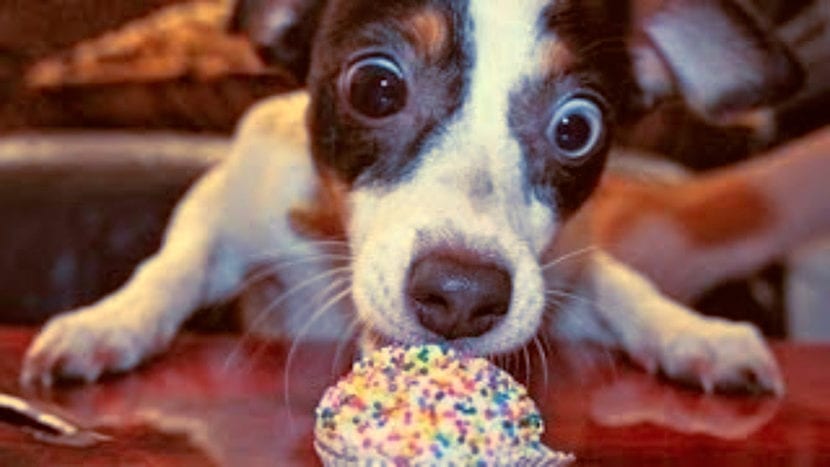
Where are we going in dog food?
New dog foods
Today, they have arisen new companies that have created new product liness for food that really meet the needs of dogs. Thank heaven.
Products based on dehydrated food such as Naku or Sumum or cereal-free and high-moisture feed such as Accana or Orijen, as well as the hundreds of brands of balanced dog food cans (really, not like feed), bring a deal that seemed necessary to me, in the face of the abuse that was having only as an option I think the cans of meat puffed up with air and water that large surfaces offer us.
Just recently, talking to a customer at a pet store, the store manager and I struck up a conversation, and he told me what I already knew, that Consumers being more informed and prepared, demand products without cereals or little processed, giving rise to new brands with new products and the abandonment of this type of manufacturing by the usual brands. And it is that all the studies that have been carried out independently of the brands, give the same results ... dogs are carnivores and do not assimilate cereals at all well, which is the basis of the composition of feed. And that's not to mention the quality of the cereals.
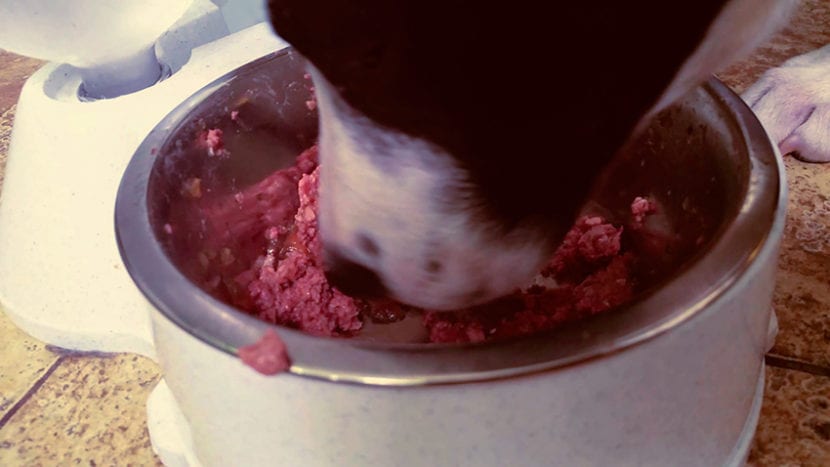
Quality is very important
As important as the nutrients that food provides us, are the quality of those nutrients. If we take a pair of old leather boots, we add used motor oil and a handful of sawdust, we beat and mix it, we make it feed and we take it to a laboratory and we ask for its nutritional value, they will give us as a result of their analysis , which has a certain amount of proteins, minerals, oils, etc. What they never tell us the truth is where those proteins, those oils, those minerals come from. And that is where the trap is dear audience.
A multinational food company has different branches and sub-sectors. They handle figures of billions and their products generate waste, which must be processed. Well instead of throwing them away, what they do is the following ...
From the chicken, it is separated for feed, which cannot be used even for the fertilizer or soap industry, which is usually beak, feathers, claws and crest. This is transformed into a chicken meal, after being disinfected with a variety of toxic chemicals, for later subject it to temperatures of almost 3000 degrees to remove any remaining chemicals and bacteria and thus obtain your chicken meal.
With this flour, they make the feed balls, subjecting them to incredible pressure (something very healthy too), and then adding flavorings, flavor fixers, stabilizers or preservatives. And then you wonder why your dog doesn't want the feed.
Then they put it in a very cool packaging, with a puppy with the face transmitting emotions and everyone buys it. That is already the final trick.
Emotional advertising
How they sell it to us
Feed companies spend billions on something called Emotional Marketing, which is the one that is aimed directly at obtaining the purchase from offering an emotion that is associated with the product. In this case, in the world of dog food, it is very easy to see, since even the same advertising and marketing agencies, use the canine food sector (along with that of baby products) to explain the fundamentals. of this Emotional Marketing.
When we buy food for our dog, whatever it is, we do it from the love that we have for it and that we want to take care of it so that it is as good as possible. That leads us to buy what we believe is the highest quality food and the best price that meets the needs of our best friend. When we see our pet happy and we see it well, we think that we are doing well, and thus we develop affinity with the brand that feeds our animal, which is the ultimate weapon of advertising professionals to create a brand and thus be able to sell it to ourselves. whatever bears the brand we have created affinity for, which gives the brand an opportunity to sell us whatever it is. Whatever is literal.
Conclusions
As we have already seen in this article, all the data that the feed industry gives us, through advertising, through its customer networks with veterinarians and shops in the sector, through congresses, fake studies or taking advantage of our own comfort what we want for our lives, what is best for dogs. However, I insist again ... if it is the best ... Why are the clinics and veterinary offices full of dogs with food allergy problems that only eat feed? ... I await the answer to this question. I promise you.
Very good article. I loved it.
More reason than a saint.
I am a veterinarian by profession and it is a subject that we ourselves acknowledge privately.
The feed creates many health problems in dogs.
In fact, my dogs only eat Champion Foods.
Hi Manolo, thanks for commenting.
I have many veterinary friends, and we also discussed that issue. Is incredible.
And if we get into the land of cats, I won't even tell you.
Champion Foods is a very good brand, however they even recommend not giving only feed, even their own, to our pets. They recommend variety. All the best!!!
Hello Antonio,
I wanted to congratulate you on your excellent articles on the great lies of animal feed, from its terrible ingredients to the real nutritional needs of dogs. I wish there were more people like you raising awareness among dog owners, because, in my experience, it is talking to people that commercial feed is not suitable and they throw themselves around my neck like I was crazy.
In my case I have two cats, and I would love to find a person who is as fond of cats as you are of dogs. I did not know anything about animal nutrition and as the vast majority gave them I think. Until my 5-year-old cat suffered from kidney problems. My veterinarian sent me the Royal Canin Renal, and when I got home with the sack of feed, what would not be my surprise when I read the ingredients: cereal flours (corn, wheat, rice), animal fats (not specified), gluten from wheat and corn, beet pulp, soybean oil,…. Is this what a sick cat has to eat? That's when I started looking for nutritional information. Curiously, all the people around me, including my veterinarian, are outraged if I speak ill of Royal Canin and they all assure that it is the best selling brand in Spain. I have resigned myself to being like a lunatic for not wanting to give feed to my cats.
I was delighted to find your articles, thank you very much for your page,
a cordial greeting!